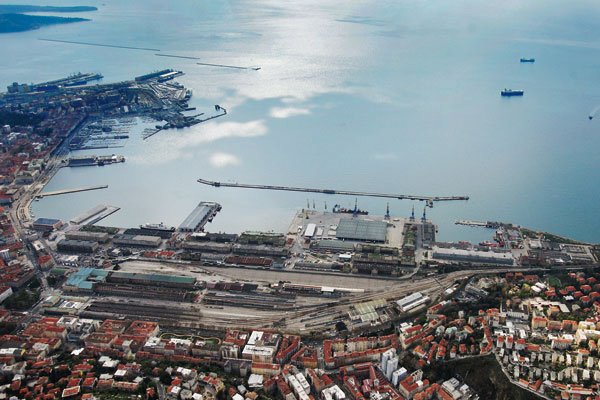TRIESTE: 58 UNBEARABLE YEARS OF ECONOMIC AND POLITICAL OPPRESSION.
A BREACH OF THE RULES-BASED INTERNATIONAL ORDER.

The international Free Port of Trieste, State corporation of the Free Territory of Trieste.
20 September 2012: I am standing before the Court of Trieste versus agency Equitalia.
The agency is trying to collect court fees and sanctions issued by the Court of Cassation.
In 2010 I opposed to a building speculation that was both against the environment and in breach of city planning provisions. In turn, the Municipality of Muggia’s the Municipality’s Commissione Edilizia (Board of works) denounced me claiming my opposition was defamatory.
It is about EUR 32,000. Plus EUR 1,500 more. Indeed, when the Court of Cassation rejected my appeal, it added its own EUR 1,500 fee. And, by rejecting my appeal, it upheld my conviction.
After the decision became res iudicata, in another trial, I challenged Italian sovereignty over the Free Territory of Trieste. Consequently, I did also question the source of the local Italian judiciary’s authority over Trieste. This is the story of the first exception of jurisdiction.
Indeed, the absolute lack of jurisdiction is a preliminary exception. This means it can be brought forward at any time during a discussion before Court. And it is absolute because it doesn’t just affect the final decision, but the whole trial.
§
The absolute lack of jurisdiction renders a trail null and void. Therefore, it must be recognized automatically, no matter the proceeding’s phase.
And this is the case for all of Trieste’s citizens and residents: they cannot be subject to the Italian legal order. Because Italy is a foreign Country.
Indeed, the Free Territory of Trieste is a recognized independent State under the 1947 Italian Prace Treaty. A multilateral Treaty in force. Even within the Italian legal order, because Italy is the defeated country here.
Also, in 1954 the Free Territory changed provisional Government (the Governments of the US and of the UK sub-entrusted Trieste to the Italian Government, hence assigning to it a new, additional role that has nothing to do with that of the Italian State’s elected Government). Trieste is still fully independent.
It is also true that the Italian authorities are hiding it well since 1954. They do often simulate Italian sovereignty: this renders those acts null and void. As long as the people of the Free Territory exercise their rights and dispute such simulation, of course.
Because if the people of Trieste exercise their rights, granted under the 1947 Italian Peace Treaty, there is little the sub-adminsitering Italian authorities can do about. Indeed, it is undeniable rights.
If an Italian Court denies the Peace Treaty, that is a crime. Against both Italian law and the rules based international order. Maybe this is why so far no exception of jurisdiction resulted in a judgment.
Che negli ambienti istituzionali italiani vi sia un discreto imbarazzo nell’affrontare una situazione estremamente delicata per i suoi risvolti internazionali (mettere per iscritto che si sta violando il Trattato di Pace avrebbe conseguenze non propriamente positive per l’Italia) è ben evidente.
Come si fa a contestare un cittadino che dimostra, Trattato di Pace alla mano, che Trieste è indipendente dall’Italia?
But Equitalia’s lawyers don’t care.
This is what they say when I argue that their agency has no mandate to act in the Province of Trieste on behalf of a foreign State (Italy):
“Claiming that the Italian State has no jurisdiction over the province of Trieste and that the collection agency cannot take action is an exception that absolutely lacks ground”.
That’s it.
Shall we trust those lawyers’ “indisputable” words, which they proclaim as their represent an Italian agency?
Their written statement is indeed burdensome: they are denying a WWII Peace Treaty, one at the core of the rules based international legal order.
§
A statement that lacks any evidence. The same old way of Italian “law”, born from centuries of well-distributed illegality..
What does the 1947 Peace Treaty attached to my appeals and dismissed by Equitalia SpA actually rule?
All’articolo 21 comma 2:
“Italian sovereignty over the area constituting the Free Territory of Trieste, as above defined, shall be terminated upon the coming into force of the present Treaty.”
Italy signed the Peace Treaty at Paris, on 10 February 1947. It is in force since 15 September 1947. The Italian legal order in force implements and enforces it with the Legislative Decree No. 1430 of the Provisional Head of State, issued on 28 November 1947. Before the Italian Constitution itself (1 January 1948).
This is why the Peace Treaty is also an Italian Law, published on the Italian Official Gazzette: LINK).
This means that all the obligations established with the Peace Treaty are in full force. And all Signatories must comply with them.
Equitalia’s behavior is very serious. The agency claims that it can act in the Free Territory of Trieste without mandate, on behalf of a foreing State – Italy. Furthermore, its lawyers claim that the people of the Free Territory’s claims for the Rule of Law are “the result of historical-legal fantasies” and “without any legal base”.
Giuseppe Prezzolini in his “Codice della Vita Italiana” (Code of Italian life) writes:
“The main flaws of the Italians, and especially the most shameful: the lack of words, servilism, exaggerated individualism, the use to small deceits and corruption, they all come from the Italians’ poverty, just as the filth in many of their towns comes from the lack of water. When more true money and clean water flow through Italy, then Italy’s redemption will be about complete …”
Italy’s “redemption” is still far away. Trieste’s… not so much.
Translated from Roberto Giurastante’s blog “Ambiente e Legalità” (Environment and Legality).
